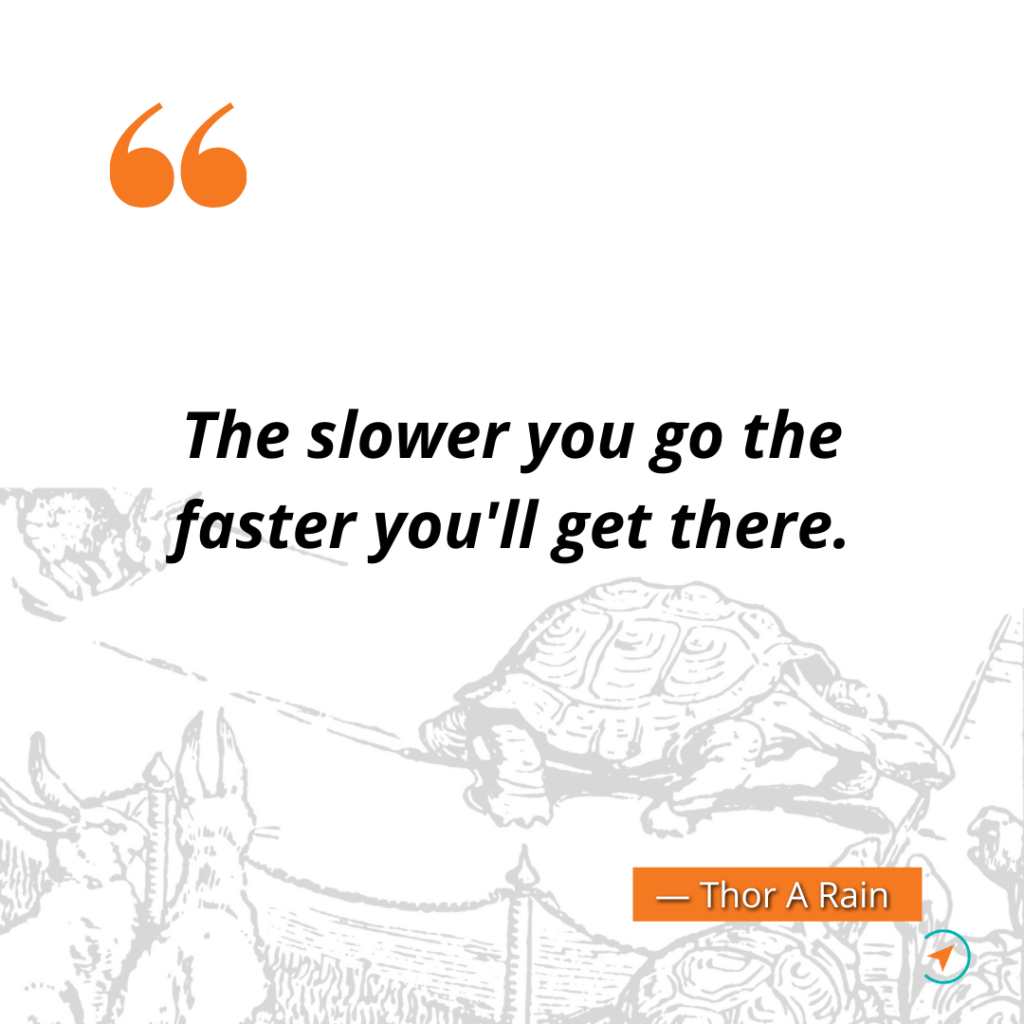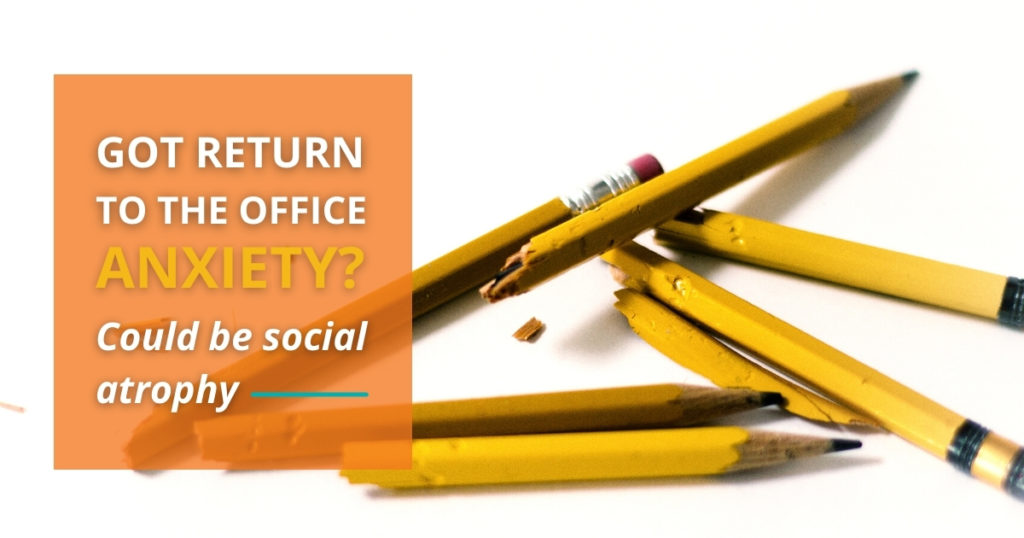
Reading time: 7 minutes
Does the thought of a return to the office make you feel uneasy or anxious? You’re not alone and could be suffering from social atrophy…
It’s September and for many, that means a return to the office after holidays and easing of lockdown restrictions. Following months of home-working or furlough and social distancing, the thought of a return to the office might make you feel uneasy. If it does, you’re not alone.
A recent global survey from Limeade Institute revealed that 100% of respondents are feeling some anxiety about returning to the office. That’s an extraordinary statistic. That means everyone who answered is experiencing anxiety, everyone!
So what are people anxious about?
The survey of 4,553 people from across the globe found that the top reasons for return to the office anxiety included: exposure to COVID-19 (77%), less flexibility (71%), and commuting to work (68%).
So that’s the obvious stuff but what about social aspects? How are you feeling about social interactions like small talk and negotiations? Or even office noise?
The impact of reduced socialisation
Research involving people like hermits, astronauts and soldiers highlights how social stamina and skills are like muscles that atrophy from lack of use.
A growing body of research outlined in The Scientist shows how social isolation can affect your ability to actually think and even increase the risk of inflammation.
This means that lack of social contact over the last 18 months will have had an impact on you and it’s likely that you’re experiencing at least some social atrophy.
What is Social Atrophy?

We first looked at the concept of social atrophy in this blog in June 2020. Given that a return to the office is on the cards for many people right now, we thought it would be a helpful time to revisit the topic.
Like muscle atrophy, which is when your muscles waste away through lack of use, social atrophy is when your social stamina and social skills atrophy because you haven’t been using them as much as you normally would.
A full day at the gym after 18 months with no exercise would worry you, right? By the same token, it’s understandable that you’re worried about a return to the office and socialising after reduced social contact for such a long period of time.
Now it’s important to note that this isn’t necessarily a cause for concern. After all, it’s a natural occurrence and a result of the situation we’ve all experienced over the last 18 months.
Because you may not have experienced this before nor known what it is, let’s explore it further.
Why does Social Atrophy matter?
When you return to the office and are surrounded by your colleagues once more, it’s likely you’ll experience more social stimulation than you have for a while. This will likely make you feel unusual bouts of tiredness, difficulty thinking clearly and even headaches. You’re likely to less tolerant of yourself and others. All of this can be detrimental to your mood, your body and your relationships with others.
You may not realise it, but it takes a lot of energy to process social stimulation, such as different voices and noises. If you’ve ever experienced ill health, you’ll likely have some sense of this. But if you haven’t, it can come as a surprise and feel disconcerting.
Now, this isn’t limited to going to the office. It also applies in your personal life. Meeting up with friends, going to noisy places like a restaurant or going to a social event like weddings where you may not know everyone all rely on your social skills and stamina.
Fortunately, social atrophy can be reversed, just like muscle atrophy: But if you don’t know this is what’s going on, you can’t address it.
What is Social Stamina?
We define social stamina as: “The energy and capacity you have for engaging in social interactions for a duration of time“. Think of it like your social budget or bank account.
It’s important to understand that social stamina is slightly different from your normal stamina that allows you to complete day-to-day tasks. Social stamina relates specifically to social situations and stimulation.
So even if you feel as though you have lots of energy, social atrophy can lead to social stimulation tiring you out faster than it did when you were socially fit and strong.
Another thing to consider is whether you tend to be more introverted or more extroverted. Being more introverted means that we are often drained by social stimulation. Being more extroverted means we are more likely to be nourished by it. Think of it as a spectrum, where would you be? Take this into account as you return to the office and step up your social interactions.
What are Social Skills?
As well as your social stamina, your social skills will also likely have atrophied during lockdown. Feeling comfortable interacting with others, maintaining eye contact during conversations and waiting for your turn to speak are all examples of social skills.
Like with any skill, we can become a bit rusty when we don’t use them. You may find that you’re more clumsy socially or that you share more about yourself than you intend to. This can lead to social interactions feeling awkward and uncomfortable. With the impact of Covid on your social interactions both personal and professional, it’s understandable that your social skills will need some limbering up and practice.
How do I know if I’m suffering from Social Atrophy?
There are a number of indicators to tell if you’re suffering from social atrophy:
- Do you feel more tired than usual when around others?
- Are you avoiding social situations, possibly without realising it?
- Are you struggling to start a conversation or feeling clumsy?
- Do you feel overwhelmed around other people?
- Are you getting headaches or struggling to think halfway through conversations?
N.B. This is different than if you struggled with social anxiety before the pandemic. The information and tools here can help ease social anxiety but additional support may be needed.
How to reverse Social Atrophy and return to the office in a helpful way – The 5-point plan
1. Realistic expectations
It’s going to take time to recover your social stamina and skills. The rule of thumb is a ratio of 1:1 for days and weeks. A day to recover from a day and a week to recover from a week. Any longer and the ratio is more like 1:½. So if it’s been 18 months, it’ll likely take you around nine months to build back up. Read more in my retreat experience blog.
2. Pacing is important
Pace your social activity and allow rest times in between. Mix up your activities too, like you would with exercises in the gym. Start by going into the office for shorter periods and then build up. Factor in extra rest in the early days by reducing other social contact.
3. Your body plays a part
Your social stamina and skills require energy. You can boost your energy by eating healthy and colourful food. Top up your sleep too with extra naps or earlier bedtimes. Physical activity helps boost your metabolism, even just doing a few extra trips up and down the stairs counts.
4. Mindset matters
Get curious about any guilt, frustration, or inadequacy you’re feeling. Feelings are information so listen to what your feelings are telling you. Remember it’s more helpful to be curious than critical, so get your sherlock on.
5. Patience and kindness
Cut yourself some slack when you’re clumsy, inappropriate or snappy. Apologise where helpful. This is not about being perfect. This is about keeping it real — that’s the magic. Remember that it’s not just you who is experiencing social atrophy. It’s going to take time for us all to adjust. So cut others some slack too.

Our invitation to you…
Our invitation to you today is to give yourself the time to create your 5-point plan. Write it down. Talk it through with people who are important to you. This could be a colleague, boss or family member.
Set realistic expectations, pace activities, look after your mindset and your body and practice being kind and patient. It’s not like you’ll always get it spot on. That’s okay. When you realise you’re off track, bring yourself gently back and give yourself credit for practising. You got this!
Connect with us on Facebook and Instagram. Sign up for our fortnightly newsletter to get helpful tips and tools straight to your inbox.
Go gently, hold steady, stay the course.
All the best, Thor

PLEASE NOTE THAT THOR A RAIN IS NOT A MEDICAL DOCTOR. THE HELPFUL CLINIC IS NOT A MEDICAL CLINIC AND THIS IS NOT MEDICAL ADVICE. FOR MORE INFORMATION CLICK HERE

